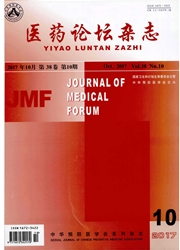

 中文摘要:
中文摘要:
目的尿微量白蛋白与转化生长因子β1在高血压肾病发病机制中的作用价值。方法选取郑州大学第一附属医院收治的360例患者作为研究对象,分为128例高血压肾病组、112例高血压组、120例对照组,用酶联免疫吸附法测定血清转化生长因子β1水平,用常规生化法检测尿微量白蛋白水平,并进行组间比较。结果血清转化生长因子β1的水平在对照组和高血压组之间有统计学意义,P〈0.05;高血压组和高血压肾病组之间有统计学意义,P〈0.05;尿微量白蛋白在对照组和高血压组之间无统计学意义,P〉0.05;高血压组和高血压肾病组之间有统计学意义,P〈0.05。结论对高血压肾病患者进行TGF-β1、尿微量白蛋白检测监护,可以及早发现肾功能损害、及早治疗,对于降低患者的死亡率和提高患者身体健康有着极其重要意义。
 英文摘要:
英文摘要:
Objective To study the diagnosis value of transforming growth factor beta 1( TGF- β1) combined microalbuminuria in hypertensive nephropathy. Methods In our hospital treated 180 patients,divided into 128 cases of hypertensive nephropathy group,112 cases of hypertension group and 120 cases of the control group as the research object,then determinations of TGF- β1 serum levels by ELISA and microalbuminuria levels by using conventional biochemical method were done,and comparison between two groups was also made. Results Showed that there was statistical significance for transforming growth factor beta 1 of the Serum level between the control group and hypertension group,P〈 0. 05;And between hypertension group and hypertensive nephropathy group,P 〈0. 05; There was no statistical significance for microalbuminuria between the control group and hypertension group,P 〉0. 05;While there was statistical significance between hypertension group and hypertensive nephropathy group,P 〈0. 05. Conclusion Shows that renal function damage can be found and treated if The TGF- β 1 and microalbuminuria patients with hypertensive nephropathy are detected,and there are extremely important significance to reduce the mortality and to improve the patient's physical health.
 同期刊论文项目
同期刊论文项目
 同项目期刊论文
同项目期刊论文
 期刊信息
期刊信息
